Brainymaniac
On this page, you find all documents, package deals, and flashcards offered by seller BrainyManiac.
- 725
- 0
- 29
Community
- Followers
- Following
2 Reviews received
756 items
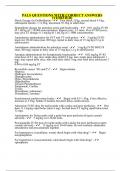
PALS QUESTIONS WITH CORRECT ANSWERS (VERIFIED)
PALS QUESTIONS WITH CORRECT ANSWERS (VERIFIED)
- Package deal
- Exam (elaborations)
- • 2 pages •
PALS QUESTIONS WITH CORRECT ANSWERS (VERIFIED)
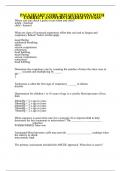
PALS HEART CODE 2025 QUESTIONS WITH CORRECT ANSWERS GRADED TO PASS
Where can you check a pulse on an infant and child? infant - brachial child - femoral What are signs of increased respiratory effort that can lead to fatigue and respiratory failure? Select all that apply nasal flaring unlabored breathing apnea seesaw respirations retractions head bobbing nasal flaring seesaw respirations retractions head bobbing Determine the respiratory rate by counting the number of times the chest rises in _____ seconds and multiplying by _____. 30 ...
- Package deal
- Exam (elaborations)
- • 12 pages •
Where can you check a pulse on an infant and child? infant - brachial child - femoral What are signs of increased respiratory effort that can lead to fatigue and respiratory failure? Select all that apply nasal flaring unlabored breathing apnea seesaw respirations retractions head bobbing nasal flaring seesaw respirations retractions head bobbing Determine the respiratory rate by counting the number of times the chest rises in _____ seconds and multiplying by _____. 30 ...
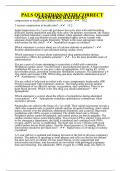
PALS QUESTIONS WITH CORRECT ANSWERS RATED A+
compression to breath ratio children with 1 rescuer - 30:2 2 rescuer compression to breath ratio? - 15:2 Initial impression of a 2-year old girl shows her to be alert with mild breathing difficulty during inspiration and pale skin color. On primary assessment, she makes high pitched inspiratory sound (mild stridor) when agitated; otherwise, intercoastal retractions. Lung auscultation reveals transmitted upper airway sounds with adequate distal breath sounds bilaterally. Which is the ...
- Package deal
- Exam (elaborations)
- • 5 pages •
compression to breath ratio children with 1 rescuer - 30:2 2 rescuer compression to breath ratio? - 15:2 Initial impression of a 2-year old girl shows her to be alert with mild breathing difficulty during inspiration and pale skin color. On primary assessment, she makes high pitched inspiratory sound (mild stridor) when agitated; otherwise, intercoastal retractions. Lung auscultation reveals transmitted upper airway sounds with adequate distal breath sounds bilaterally. Which is the ...
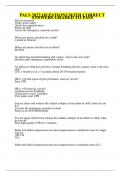
PALS 2022 QUESTIONS WITH CORRECT ANSWERS GRADED TO PASS
BLS Assessment Verify scene safety Check for responsiveness Shout for help Active the emergency response system Where are pulses checked on a child? Carotid or femoral Where are pulses checked on an infant? Brachial An infant has normal breathing and a pulse, what is the next step? Monitor until emergency responders arrive An infant or child does not have normal breathing but has a pulse, what is the next step? Give 1 breath every 2-3 seconds (about 20-30 breaths/minu...
- Package deal
- Exam (elaborations)
- • 29 pages •
BLS Assessment Verify scene safety Check for responsiveness Shout for help Active the emergency response system Where are pulses checked on a child? Carotid or femoral Where are pulses checked on an infant? Brachial An infant has normal breathing and a pulse, what is the next step? Monitor until emergency responders arrive An infant or child does not have normal breathing but has a pulse, what is the next step? Give 1 breath every 2-3 seconds (about 20-30 breaths/minu...
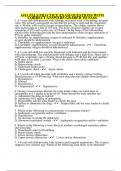
AHA PALS PRACTICE EXAM QUESTIONS WITH CORRECT ANSWERS GRADED TO PASS
1. A 5-year-old child presents with lethargy, increased work of breathing, and pale color. The primary assessment reveals that the airway is open and the respiratory rate is 30/min, with crackles heard on auscultation. The cardiac monitor shows sinus tachycardia at a rate of 165/min. The pulse oximeter displays an oxygen saturation of 95% and a pulse rate of 93/min. On the basis of this information, which of the following provides the best interpretation of the oxygen saturation of 95% by pulse ...
- Package deal
- Exam (elaborations)
- • 11 pages •
1. A 5-year-old child presents with lethargy, increased work of breathing, and pale color. The primary assessment reveals that the airway is open and the respiratory rate is 30/min, with crackles heard on auscultation. The cardiac monitor shows sinus tachycardia at a rate of 165/min. The pulse oximeter displays an oxygen saturation of 95% and a pulse rate of 93/min. On the basis of this information, which of the following provides the best interpretation of the oxygen saturation of 95% by pulse ...
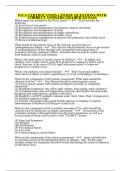
PALS CERTIFICATION COURSE QUESTIONS WITH CORRECT ANSWERS GRADED TO PASS
Which topics are included in the PALS course ? - PALS includes the following: (1) Overview of assessment (2) Recognition and management of respiratory distress and failure (3) Recognition and management of shock (4) Recognition and management of cardiac arrhythmias (5) Recognition and management of cardiac arrest (6) Postresuscitation management of patients with pulmonary and cardiac arrest (7) Review of pharmacology What should be the primary focus of the clinician on prevention o...
- Package deal
- Exam (elaborations)
- • 12 pages •
Which topics are included in the PALS course ? - PALS includes the following: (1) Overview of assessment (2) Recognition and management of respiratory distress and failure (3) Recognition and management of shock (4) Recognition and management of cardiac arrhythmias (5) Recognition and management of cardiac arrest (6) Postresuscitation management of patients with pulmonary and cardiac arrest (7) Review of pharmacology What should be the primary focus of the clinician on prevention o...
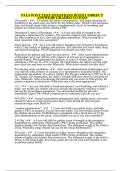
PALS POST TEST QUESTIONS WITH CORRECT ANSWERS GRADED TO PASS
10 seconds - A 6 month old infant is unresponsive. You begin checking for breathing at the same time you check for the infants pulse. Which is the maximum time you should spend when trying to simultaneously check for breathing and palpate the infants pulse before starting CPR? Disordered Control of Breathing - A 4 year old child is brought to the emergency department for seizures. The seizures stopped a few minutes ago, but the child continues to have slow and irregular respirations. Wh...
- Package deal
- Exam (elaborations)
- • 5 pages •
10 seconds - A 6 month old infant is unresponsive. You begin checking for breathing at the same time you check for the infants pulse. Which is the maximum time you should spend when trying to simultaneously check for breathing and palpate the infants pulse before starting CPR? Disordered Control of Breathing - A 4 year old child is brought to the emergency department for seizures. The seizures stopped a few minutes ago, but the child continues to have slow and irregular respirations. Wh...
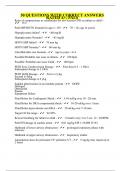
50 QUESTIONS WITH CORRECT ANSWERS RATED A+, PALS
Ratio of compressions to ventilations for two rescuer CPR on infant or child? - 15:2 Pedi SBP HOTN formula for ages 1-10? - 70 + (2x age in years) Hypoglycemia infant? - <60 mg/dl Hypoglycemia Neonate? - <45 mg/dl HOTN SBP Infant? - 70 mm hg HOTN SBP Neonate? - 60 mm hg Uncuffed tube size formula - Age in years / 4+4 Possible/Probable rate issue in infants - 220 bpm Possible/ Probable rate issue Child - 180 bpm PEDI Sync Cardioversion D...
- Package deal
- Exam (elaborations)
- • 3 pages •
Ratio of compressions to ventilations for two rescuer CPR on infant or child? - 15:2 Pedi SBP HOTN formula for ages 1-10? - 70 + (2x age in years) Hypoglycemia infant? - <60 mg/dl Hypoglycemia Neonate? - <45 mg/dl HOTN SBP Infant? - 70 mm hg HOTN SBP Neonate? - 60 mm hg Uncuffed tube size formula - Age in years / 4+4 Possible/Probable rate issue in infants - 220 bpm Possible/ Probable rate issue Child - 180 bpm PEDI Sync Cardioversion D...
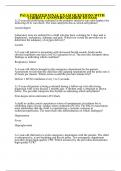
PALS UPDATED FINAL EXAM QUESTIONS WITH CORRECT ANSWERS GRADED TO PASS
A 12-year-old child being evaluated in the pediatric intensive care unit displays the following ECG waveform. The team interprets this as which arrhythmia? second degree Laboratory tests are ordered for a child who has been vomiting for 3 days and is diaphoretic, tachypneic, lethargic and pale. Which test would the provider use to determine the adequacy of oxygen delivery? Lactate A 9-year-old patient is presenting with decreased breath sounds, bradycardia, slowed respiratory rat...
- Package deal
- Exam (elaborations)
- • 8 pages •
A 12-year-old child being evaluated in the pediatric intensive care unit displays the following ECG waveform. The team interprets this as which arrhythmia? second degree Laboratory tests are ordered for a child who has been vomiting for 3 days and is diaphoretic, tachypneic, lethargic and pale. Which test would the provider use to determine the adequacy of oxygen delivery? Lactate A 9-year-old patient is presenting with decreased breath sounds, bradycardia, slowed respiratory rat...
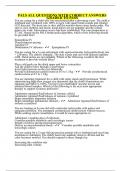
PALS ALL QUESTIONS WITH CORRECT ANSWERS GRADED TO PASS
You are caring for a child who was resuscitated after a drowning event. The child is intubated and ventilated with 100% oxygen with equal breath sounds and exhaled CO2 detected. The heart rate is slow and the monitor shows sinus bradycardia. The skin is cool, mottled, and moist; distal pulses are not palpable and the central pulses are weak. Intravenous access has been established. The core temperature is 37.3oC. Based on the PALS bradycardia algorithm, which of the following should be provided ...
- Package deal
- Exam (elaborations)
- • 10 pages •
You are caring for a child who was resuscitated after a drowning event. The child is intubated and ventilated with 100% oxygen with equal breath sounds and exhaled CO2 detected. The heart rate is slow and the monitor shows sinus bradycardia. The skin is cool, mottled, and moist; distal pulses are not palpable and the central pulses are weak. Intravenous access has been established. The core temperature is 37.3oC. Based on the PALS bradycardia algorithm, which of the following should be provided ...

TNCC: TRAUMA NURSING PROCESS QUESTIONS WITH CORRECT ANSWERS RATED A+
NHA PCT MODULE 1 QUESTIONS WITH CORRECT ANSWERS